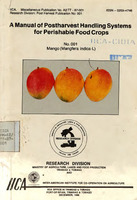Mostrar registro sencillo
| dc.contributor.author | Instituto Interamericano de Cooperación para la Agricultura (IICA) | |
| dc.date.accessioned | 2020-03-22T01:31:42Z | |
| dc.date.available | 2020-03-22T01:31:42Z | |
| dc.date.issued | 1986-12 | |
| dc.identifier.issn | 0253-4741 | |
| dc.identifier.uri | https://repositorio.iica.int/handle/11324/8877 | |
| dc.description | 26 páginas | es |
| dc.description.abstract | Although the challenge to retain good marketable quality and reduce postharvest losses of tropical fruits is a difficult one, there is much that can be, but is not currently done to this end in Trinidad and Tobago. Tropical fruits, unlike their temperate counterparts are exposed to high ambient temperatures (28¦C-32¦C) and high respiratory rates and hasten the processes of ripening and senescence thus reducing the shelf life of tropical fruits. Tropical climates also encourage the proliferation of many disease causing organisms which gice rise to rotting and spoilage of fruits. Insect populations in the tropics cause substancial damage to fruits both in the pre and postharvest periods. It is clear that the postharvest life of tropical fruits is affected by a complex interaction of many adverse factors | es |
| dc.language.iso | es | es |
| dc.publisher | IICA | es |
| dc.subject | Trinidad y Tobago | es |
| dc.subject | Mango | es |
| dc.subject | Variedad | es |
| dc.subject | Tecnología | es |
| dc.subject | Postcosecha | es |
| dc.subject | Transporte | es |
| dc.subject | Almacenamiento | es |
| dc.subject.other | Representación Trinidad y Tobago | es |
| dc.title | A manual of postharvest handling systems for perishable food crops | es |
| dc.type | Libro | es |
Ficheros en el ítem
- Nombre:
- BVE20037890i.pdf
- Tamaño:
- 609.8Kb
- Formato:
- PDF
Este ítem aparece en la(s) siguiente(s) colección(ones)
Mostrar registro sencillo


